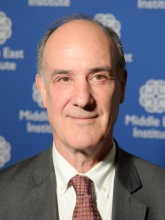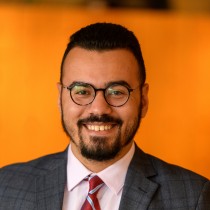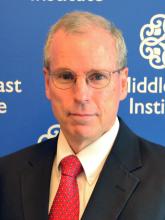This week's briefing on recent news and upcoming events in the region featuring Paul Salem, Jonathan M. Winer, Gonul Tol, Mohammed Soliman, Marvin G. Weinbaum, Elizabeth Dent, Mirette F. Mabrouk, and Robert S. Ford.
Regional reverberations of the Sudan-Israel announcement
Paul Salem
President

Unlike the UAE, Sudan is a politically and economically fragile country in the midst of a precarious transition. It does not project power, and while its economic fortunes might be buoyed by the normalization agreement with Israel and by a long-awaited opening with the U.S., its political transition and stability might also be negatively impacted by the agreement, which does not enjoy much public support.
Nevertheless, Sudan is one of the main countries on the Red Sea, and its joining of the UAE-Egypt-Israel axis gives those countries — and in the background, Saudi Arabia — further influence in that vital waterway and the Horn of Africa, and helps them counteract other regional rivals, especially Turkey and Qatar. Along that line, there is discussion in some of the Israeli press that normalization between Israel and Somaliland could be next. The agreement does not impact the geopolitics in the Mediterranean, although it does marginally help consolidate that coalition's presence on Libya’s eastern borders.
The agreement weakens the Palestinian negotiating position against Israeli occupation, but it also further erodes the longstanding taboo against normalization with Israel. Whether other Arab states will step forward in the coming months is not clear, although large economies like Saudi Arabia and Morocco might be considering the opportunity cost of postponing opening up to Israel while other regional economies go ahead.
In the Levant, the agreement has raised the possibility in Lebanon that recently launched Lebanon-Israel maritime talks — with American mediation — might be leveraged by the Americans and Israelis to push Lebanon toward more political discussions. Lebanon, like Sudan, is in dire economic straits, and needs U.S. support for any eventual economic rescue and reform package. But the Hezbollah-backed ruling oligarchy will certainly block that pathway. In Syria, Bashar al-Assad always has a “trump” card up his sleeve, in case he needs it, which is opening talks with Israel. For the time being, support from Iran (and Russia) has ensured his regime's survival, but if Iran falters in the future, he could play that card and find a way back from extinction.
There is no doubt that the Middle East — particularly in the midst of one of the worst health and socio-economic crises in a century — is in dire need of de-escalating conflict. If the recent agreements are part of a wider trend of building regional cooperation, then they are a harbinger of good things. If we are instead simply witnessing the creation of a new regional coalition designed to confront and escalate conflict with two other regional coalitions, the Iranian and the Turkish, then the Middle East could be headed into another round of costly conflict.
@paul_salem
Will nationwide cease-fire in Libya enable new political agreements?
Jonathan M. Winer
MEI Scholar

When acting head of the U.N. mission in Libya Stephanie Williams announced on Oct. 23 that rival forces in Libya had agreed to a permanent nationwide cease-fire that included requiring the departure of all foreign fighters and mercenaries from the country for a minimum of three months, she called it “a good day for the Libyan people.”
Just three days later, Williams convened the first virtual meeting of the Libyan Political Dialogue Forum (LPDF), which could help determine whether political agreements with concrete steps will swiftly follow.
Meanwhile, quiet talks continue among Libyan factions on a possible deal in which Libyan Prime Minister Fayez al-Sarraj, who has said he will resign his position on Oct. 31, would be replaced by a new prime minister. Under this deal, al-Sarraj might still act as head of state as head of the Presidential Council established under the December 2015 Skhirat Libyan Political Agreement (LPA), but no longer serve as head of government. The latter role would go to a new prime minister, as part of a new Libyan cabinet formally approved by the House of Representatives (HoR) in Tobruk in consultation with Tripoli’s State Council.
The hoped-for result is that this reinvigorated Libyan government would then function better than the al-Sarraj government has over the past four and a half years. A more effective national government with some fresh legitimacy might improve public hope and confidence, breathe new life into the U.N. Support Mission in Libya-sponsored political talks, and pave the way for elections under an updated Libyan constitution.
Will any of this happen? Someone could break the cease-fire. Foreign military forces could refuse to leave Libya. Political talks could break down, or the HoR and State Council could fail to agree on a new PM and cabinet. Skeptics of Libyan progress always have good cause for caution. But there are now glimmers of hope, which could widen if Libyan oil exports rebound, unleashing new revenues that are then used to provide Libyans the foreign goods such as food and medicine they still need to live.
@jonathanmawiner
Turkey’s new foreign policy doctrine comes up short
Gonul Tol
Director of Turkey Program and Senior Fellow, Frontier Europe Initiative

One of the mottos of Turkish President Recep Tayyip Erdogan’s new foreign policy doctrine is that Turkey has to be on the ground to be at the table. To that end, Turkey has deployed hard power, as well as harsh rhetoric, in regional crises and played a spoiler role in international diplomatic efforts to resolve disagreements. Erdogan deployed the Turkish navy to the eastern Mediterranean in the hopes of spoiling the status quo there, backed Azerbaijan in the latest flare up in Nagorno-Karabakh and told his allies in Baku to fight on until the occupied territories are recaptured, deployed thousands of troops to neighboring Syria and vowed to fight to the “last terrorist” there, and helped bring a hardline Turkish Cypriot leader just as uncompromising as himself to power on the divided island of Cyprus.
Erdogan’s lack of enthusiasm for diplomacy was on full display again on Friday after a permanent cease-fire was signed between Libya’s warring factions. The cease-fire announcement was welcomed by the international community, but Erdogan said that it lacked credibility. Shortly after that, Libyan officials from the Turkey-backed Government of National Accord announced that their military partnership with Turkey will continue despite a clause in the cease-fire agreement that urges the departure of foreign fighters and military trainers and the suspension of any military agreements each side struck with their foreign backers.
Erdogan shows no sign of backing down on his militaristic posture, but the view that Turkey has to be on the ground to be at the table clearly does not reflect the reality on the ground. In fact, the opposite has proven true. Turkey has intervened militarily in the Libyan conflict to support the Tripoli government, but Ankara was missing from the U.N.-led diplomatic efforts to secure the latest cease-fire. Acting U.N. Libya envoy Stephanie Williams traveled to many capitals before Friday’s announcement, but Ankara was not one of them. The more Turkey gets involved militarily in regional crises, the more isolated it becomes diplomatically.
@gonultol
Sudan normalizes ties with Israel as economic woes worsen
Mohammed Soliman
Non-Resident Scholar

Following Sudan's transfer of $335 million to compensate U.S. terror victims, President Donald Trump removed it from the list of State Sponsors of Terrorism (SST), paving the way for a U.S.-sponsored normalization deal between Sudan and Israel on Oct. 23. The Trump administration linked Sudan's removal from the SST list and its normalization with Israel, leaving no space for Sudanese Prime Minister Abdalla Hamdok and his transitional government to separate the two issues.
The Sudanese Transitional Council's military and civilian factions view the normalization with Israel and Sudan's subsequent removal from the SST list as a necessary move to revive the country’s ailing economy. Almost one year after former President Omar al-Bashir's downfall, PM Hamdok and the civilian-led government are under constant pressure from the public because of the deteriorating economic situation — limited trade and foreign currency, spiraling inflation and debt, electricity outages, increasing food insecurity, and gasoline shortages. Regular protests against the worsening economic situation have started to undermine the transitional government's legitimacy and tilt power from the civilian factions to the military, whose leadership was eager to normalize ties with Israel. These political and economic realities eventually created enough impetus for PM Hamdok to change course and join forces with Gen. Abdel-Fattah Burhan, head of the transitional government, to finalize the normalization agreement with Israel in return for removing Sudan from the SST.
Sudan’s removal means the U.S. will change course, supporting IMF and World Bank debt relief packages for the country, such as the Heavily Indebted Poor Countries (HIPC) Initiative, and facilitating other multilateral loans and financing. Sudan also hopes that its removal from the SST list will help lure foreign direct investment to create much-needed jobs. However, in the short term, Sudan might still be far from having the necessary financing to stabilize its economy, especially in the midst of COVID-19.
Politically, there are risks as well: The Bashir regime’s remaining figures and Islamist factions could weaponize the normalization deal with Israel in an attempt to topple the Hamdok government. Furthermore, in the absence of any immediate economic benefit for Sudanese citizens, Sudan’s transition to democracy will become increasingly unstable.
@soliman91
The Afghan Taliban’s calculated campaign of violence
Marvin G. Weinbaum
Director for Afghanistan and Pakistan Studies

Nothing in the Feb. 29 agreement with the Taliban committed it to halt or reduce violence. American negotiators nevertheless took away from the Doha negotiations an understanding that a reduction in violence would follow on the bilateral deal. The Taliban was expected to refrain from attacking departing American forces and to ease up strikes against Afghanistan’s urban centers. It was hoped, moreover, that with the opening of formal negotiations among Afghans — originally scheduled to begin within 10 days of the bilateral agreement’s signing — a cease-fire would be the first item on the agenda. As anticipated, the Taliban has avoided directly attacking American assets, and until recently mounted no major operations against provincial capitals or Kabul. Meanwhile, the Taliban has taken its deal with the U.S. as a license to spread its bloodshed across the rest of the country. As for a cease-fire, when negotiators finally sat down to talk in mid-September, the Taliban quickly took it off the table.
In just the last several weeks, while negotiators haggle over procedural rules in Doha, a wave of violence has descended on the provinces. Among the many attacks this past week, six security personnel protecting the Kamal Khan dam in Nimroz were killed by militants, and seven civilians died in a bomb blast in Ghor. Roadside bombs in Jalriz and Maidan Wardak took another 11 lives. Additionally, a bomb outside a police station in Feroz Koh left 16 dead and over a hundred people injured. Fighting between government forces and the Taliban in Lashkar Gah, Helmand’s provincial capital, has prompted 40,000 people to flee their homes due to the growing violence. The highway between Lashkar Gah and Kandahar is full of improvised explosive devices. In the worst of the week’s incidents, on Saturday, a suicide attack outside an educational institute in Kabul left at least 30 dead and over 50 wounded. But even while the Taliban was quick to distance itself from this attack — which has all the hallmarks of an Islamic State-Khorasan Province operation — it benefits from a climate of fear.
The Taliban’s aims, usually explained as designed to improve its bargaining position in the ongoing talks, are in reality more strategic. Already holding a strong hand in negotiations, its campaign of violence is designed to shake the confidence of the Afghan security forces and convince the Afghan people of their government’s inability to defend them. By creating an aura of inevitable victory, the Taliban also seeks to encourage self-serving defections from among the country’s power brokers. It expects to hasten the payoff from its strategy with the exit of the last foreign forces. Only then might the Taliban seriously turn to diplomacy, now to seal its claim on power.
This article was co-authored by Hamid Safi, Ghasharib Shoukat, and Jack Stewart, research assistants to Marvin G. Weinbaum.
@mgweinbaum
ISIS sees growth, new leadership in the year since Baghdadi’s death
Elizabeth Dent
Non-resident Scholar

One year ago today, U.S. forces carried out a raid in northwestern Syria to kill the head of ISIS’s so-called caliphate, Abu Bakr al-Baghdadi. As leader of the terrorist group during its rise, declaration of the caliphate in June 2014, and subsequent destruction in the years after, his death dealt a significant symbolic blow to the group. However, U.S. officials have remained realistic about the threat that ISIS would continue to pose despite his death. Just as Baghdadi emerged after Abu Ayyub al-Masri was killed by U.S. forces in Iraq, and before him, Abu Musab al-Zarqawi, a new leader will always rise to replace the one killed.
As cited in my most recent report, the Pentagon assesses that Baghdadi’s death had no impact on ISIS’s operations and did not change the group’s strategy. In fact, ISIS has continued to grow and increase its attacks in both Iraq and Syria. In the wake of COVID-19 and the drawdown of U.S. forces, security gaps have worsened, allowing ISIS to move more freely, conduct prison breaks, carry out more sophisticated attacks, and smuggle fighters across borders.
In Syria, in regime-controlled areas east of the Euphrates, ISIS appears to be surviving, while in areas west of the Euphrates controlled by the Syrian Democratic Forces (SDF), it even appears to be thriving. By August, 126 attacks by ISIS across Syria were reported for 2020 — compared to 144 in all of 2019, including increasingly complex attacks against SDF and regime forces. The group is suspected of blowing up a critical gas pipeline in the heart of regime-controlled territory, knocking out power across the country.
In Iraq, in the first quarter of 2020 alone, 566 ISIS attacks were reported. Another assessment found that ISIS claimed 100 attacks across Iraq in August 2020, a 25 percent increase from July, amid mounting evidence that the attacks are becoming more frequent and sophisticated.
ISIS’s newest caliph, Abu Ibrahim al-Qurashi, released a message in May declaring, “What you are witnessing these days are only signs of big changes in the region that’ll offer greater opportunities than we had previously in the past decade.” In other words, while the death of Baghdadi was a symbolic victory for the U.S.-led Global Coalition to Defeat ISIS, thousands are still ready to rise and fight in his place.
@lizydent
Despite Trump comments on GERD raising eyebrows, talks are set to resume
Mirette F. Mabrouk
Senior Fellow, Director of Egypt program

Last Friday, President Donald Trump was on a call with Israeli Prime Minister Benjamin Netanyahu and Sudanese Prime Minister Abdalla Hamdok, following the announcement of normalization between the two countries.
Trump asked Hamdok about the state of the beleaguered negotiations between Egypt, Ethiopia, and Sudan over the Grand Ethiopian Renaissance Dam (GERD) and the Sudanese PM gave a stock diplomatic answer to the effect that the three countries “hoped to reach an amicable solution soon.”
He probably expected to receive an equally standard response. It’s unlikely that he, or the White House correspondents in attendance, were expecting what came next.
The president lamented the moribund state of the negotiations, called Ethiopia “terrible’ for “breaking the deal” in reference to that country’s withdrawal from U.S.-sponsored negotiations, and then dropped a bombshell. “I said it and I say it loud and clear, “ he said, “[Egypt] could blow up that dam.”
That was news to the Egyptians. In Cairo, myriad diplomatic chins hit the ground in unison. While both Egypt and Sudan have made no bones about their mutual dissatisfaction with the lack of progress on talks, their stated position has consistently been a commitment to a negotiated settlement and there have never been any official statements about military action.
Somewhat unsurprisingly, it did not go over well with Ethiopia. Ethiopian Foreign Affairs Minister Gedu Andargachew summoned the U.S. ambassador to seek clarification. The Ethiopian Foreign Ministry also put out a statement that said, "The incitement of war between Ethiopia and Egypt from a sitting U.S. president neither reflects the longstanding partnership and strategic alliance between Ethiopia and the United States nor is acceptable in international law governing interstate relations."
However, today South African President Cyril Ramaphosa, the current chair of the African Union (AU), read out a statement announcing that talks over the GERD would recommence, after a seven-week hiatus. Perhaps in an effort to staunch speculation, the statement specified that the resumption of negotiations “is indicative of the strong political will and commitment by the leadership of the three parties involved in the negotiations to the peaceful and amicable solution of the GERD matter."
It's the latest chapter in what has become a long-running African serial. Egypt, Ethiopia, and Sudan have been in negotiations over the GERD, which will be the largest hydropower dam in Africa, for almost a decade. The latest round of negotiations are the ongoing AU-sponsored talks that have so far failed to meet Sudan and Egypt’s minimum requirement, which is an agreement with two stipulations: the first that it be legally binding and the second that it have clear dispute resolution mechanisms, both of which Ethiopia has consistently refused. Egypt and Sudan also objected when Ethiopia unilaterally started filling the dam a few months ago. The impact on Sudan was immediate: The Khartoum State Water Corporation announced on July 19 that several of its water stations near Ethiopia were put out of service due to declining water levels, and the Sudanese Ministry of Irrigation and Water Resources announced that the Blue Nile River’s water level decreased by 90 million cubic meters per day. However, rain levels this year were high and it is very unlikely there will be any near-term damage to the downstream countries.
The negotiations have foreign policy ramifications for all three parties. Egypt has been whipping up a flurry of diplomatic activity with other African countries, not least among them Sudan. Egypt is well aware that it can’t take relations with its neighbor for granted and after almost three decades of increasingly testy relations under former President Omar al-Bashir, Egypt is working hard at trying to mend bridges. Egyptian Trade and Industry Minister Nevine Gamea yesterday offered technical support for Sudanese factories affected by the economic fallout from the pandemic. Also in the works are joint projects in areas as diverse as religious training for imams and land and maritime transportation.
Ethiopia, in turn, appears to have scored a goal with Eritrea, with a visit to the GERD by Eritrean President Isaias Afwerki possibly indicating a shift in that country’s support for Egypt and Sudan’s position on the issue.
Other international players maintain a carefully calibrated supportive stance to all the parties. Christian Berger, the EU’s ambassador to Egypt, said the EU wanted “successful outcomes” while noting that the EU has sunk over €3.5 billion into water desalination and wastewater treatment in Egypt.
The resumption of the talks is good news. In what is often played up as an Egyptian-Ethiopian dispute, it was Sudan that had put its foot down and said that, in their present form, the talks were going nowhere. For any progress to be made, Egypt and Sudan’s two sticking points will have to be addressed. It remains to be seen whether the resumption of talks signals an attempt at resolution or merely the appearance of it.
@mmabrouk
Yet another Algerian constitution
Robert S. Ford
Senior Fellow

For the fourth time in the past 40 years Algerians will vote on a new constitutional text next Sunday, Nov. 1. The government set the date to coincide with Algeria’s national day marking the beginning of its war for independence, as President Abdelmadjid Tebboune’s government, backed by the Algerian army, moves to wrest control of the direction and pace of political change from the street protest movement known in Arabic as the Hirak. The 225 articles in the text reaffirm the president’s authority to name officials in the executive, the judiciary, army, and security agencies. The text would limit the president to two terms and also for the first time would give constitutional authorization for the Algerian army to deploy outside the country.
The government rolled out the new text amid a campaign against the Hirak and the media. Sixty journalists, bloggers, and activists are in detention, and last week a court sentenced one to a long prison term for his Facebook posts. To underline its control of Algeria’s political space, the government is trying to lift the parliamentary immunity of a leading opposition party leader and also issued a new regulation requiring social media outlets used in Algeria to be based in the country. The government blocked parties from organizing campaigns against the new text, but Islamist parties are already urging a no vote in the Nov. 1 referendum.
The government is not entirely displeased with the Islamist opposition because it at least is playing the government’s game. Seeking to boost its legitimacy after the poor turnout in the December 2019 presidential election, the government hopes for large participation in Sunday’s referendum. Its text will pass, as political opposition parties are weak and the government repression and the pandemic have largely shut down the Hirak. A cabinet minister stated publicly that those who reject the text “can leave the country.” Driven by frustration and economic despair, the number of young Algerians trying to cross the Mediterranean in small boats is rising quickly.
@fordrs58
Win McNamee/Getty Images
The Middle East Institute (MEI) is an independent, non-partisan, non-for-profit, educational organization. It does not engage in advocacy and its scholars’ opinions are their own. MEI welcomes financial donations, but retains sole editorial control over its work and its publications reflect only the authors’ views. For a listing of MEI donors, please click here.













